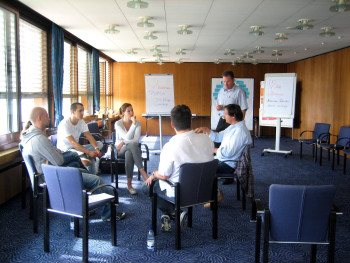Some teams just work – everyone looks forward to the next meeting, and even after a day of intensive work, there is still energy left. Some other teams, however, cannot seem to reach a reasonable dynamic. Nothing really goes smoothly, and you can almost feel the figurative sand in the gears – even without any overt conflict.

We can help.
After a thorough evaluation, we convene with the team leader to establish a central topic for the first team workshop. The further course of action is determined by this first workshop. Allowing a genuine team dynamic to flourish is an important part of our work. This is why we do not resort to pre-fabricated workshops and monotonous lectures about tools and techniques.
Our method:
We create a stimulating, interactive atmosphere in which your team can independently reflect upon and work towards as many aspects as possible. Instead of presentations or monologues about team theory, we lay down important tracks and use the appropriate methodology to support you.

